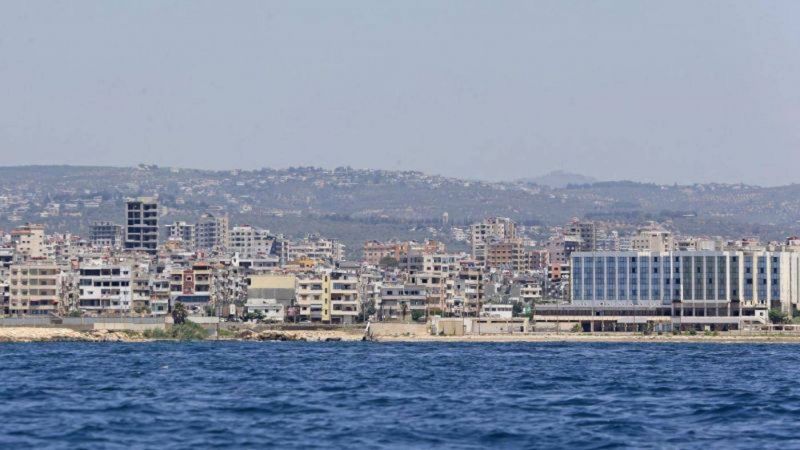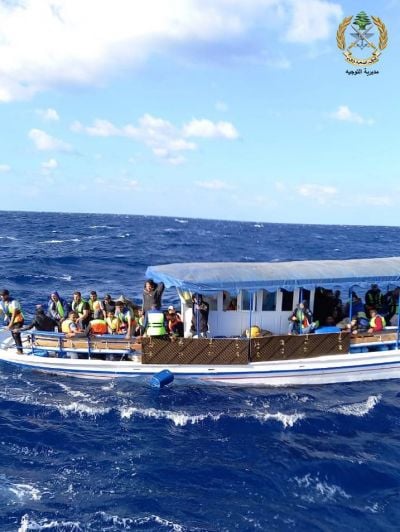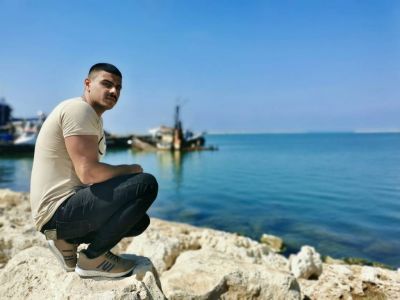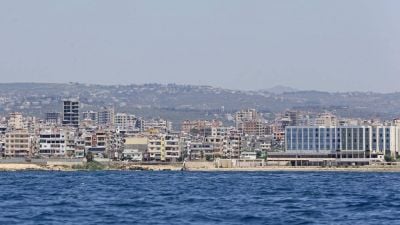
A sea view of Tartous, where the boat reportedly sank, taken September 21, 2022. (AFP/archive)
It’s been a month since they have heard any news about their loved ones and have decided to take action. Since 2019, Syrians in the regime stronghold have been trying to flee the miserable living conditions there. Despite the security risks that could ensue, 24 families of those missing in the shipwreck off the coast of Tartus on Sept. 21 issued a signed statement Wednesday calling on “all parties concerned to reveal the fate of their sons.”
“They are all young people who are physically fit and know how to swim ... and we are sure that they are not among those who drowned because their bodies would have been found as it was the case with women, children and elderly people,” the text said. “Does the sea only swallow the bodies of young men?”
While most of the 150 Syrian, Lebanese and Palestinian passengers perished in the sinking, several dozen were rescued.
Some were able to return home safely, but as the weeks went by, an increasingly plausible theory grew in the minds of the families. They believe that they were being held in Syrian or Lebanese jails, particularly since some of them had concrete proof that they were alive.
For weeks, Mona* did everything she could to find her uncle by posting his photo on social media.
“We went from hospital to hospital, one morgue to another, and even underwent a DNA test, but we still know nothing about Omar,*” she wrote to L’Orient-Le Jour via WhatsApp in early October.
On Oct. 10. she claimed that Omar had been found.
“Alive?”
“Yes, but in prison … We were told that there are some procedures to get him out,” Mona clarified. The family has since lost all trace of him.
Those who went missing like Omar fled the country illegally, so they face judicial repercussions, and may end up in prison. Since most of the 24 names on the list of the disappeared are between the ages of 17 and 30, some of them could be accused of seeking to escape compulsory military service.
“Most of them are from Latakia, especially from Sunni neighborhoods, but also from the governorates of Homs and Hama,” the statement said, highlighting a targeted crackdown by the Damascus government.
Victims of extortion
The families indicated they called the governor of Tartus for help. He responded by sending two letters, one addressed to the military security committee of the Syrian coast and the second to the Ministry of Foreign Affairs, calling on them to contact Lebanese authorities.
“The Syrian embassy in Lebanon reportedly said that none of the 24 missing people are in Lebanon,” said Mazen,* 30, from Latakia.
“We don’t think they are in the hands of the Lebanese mukhabarat, but maybe in the hands of Hezbollah. Frankly, even the Israelis would have announced it if they were holding them,” the young man said ironically.
Some parents claim to have been victims of extortion at the hands of anonymous individuals demanding “huge sums of money” in exchange for information. Mazen explained that, though no extortionists have contacted him personally, for weeks he has heard contradictory rumors about his missing little brother Mohammad,* 18, who was dreaming of reaching Europe.
The latest narrative to emerge indicates that the young people would be imprisoned in the Palestine branch — section 235, one of the worst prisons in the country — located in Damascus and managed by the Syrian secret services. “If this is the case,” Mazen said desperately, “we will never see them again.”.
This tragedy, which continues to have consequences, has not discouraged would-be departures, as boats continue to leave from the Lebanese coast. On the Facebook page created following the Sept. 21 shipwreck, internet users were looking for information on the fate of a boat that left Lebanon on Oct. 2. “Dying at sea is better than living in Syria,” said the relative of one Tartus resident, who has been missing since departing two weeks ago.
Fleeing misery
The departure of Syrians residing in regime strongholds has increased over the past two years due to the disastrous economic situation. “71 percent of residents in government areas want to emigrate, including a majority of young people, especially men, with a high or good level of education,” Samir al-Abdallah, a Syrian researcher at the Turkey-based Harmoon Center for Contemporary Studies, told L’Orient-Le Jour.
He has just published a comprehensive report entitled “Migration from Syrian regime-controlled areas after 2019, motives, destinations, effects.” “For young people, the choice to migrate is mainly related to the fact that they want to avoid joining the military service,” the researcher added.
Despite the cessation of major military operations, and while many had hoped for an improvement in the quality of life, the situation has only worsened. Families who choose to leave by sea have to pay up to $6,000 per person, which indicates that they are more likely to come from the crisis-impoverished middle class.
“Ahmad* sold his house to finance his departure. His children and wife now live with relatives. In their dreams, he would appear safe and sound in Cyprus or Greece. He would have found a job. He would have struggled for a while, but he would have ended up bringing them all to Europe,” said a relative.
“The price of houses and real estate has dropped in some areas because of excess supply, due to the desire to travel and immigrate as a family, or to ensure the immigration of young people from the family,” Abdallah said.
Most of those on the boat of death were Sunnis, in addition to an unknown number of Alawites, and two Christians — Christiane Salibi and her little daughter Rose, from the village of Kfarbo, near Hama, whose bodies were found ten days apart.
“These departures carry risks for society, starting with the demographic imbalance. This may threaten some Syrian communities, like the Christians, the Druze and the Ismailis. There is also a risk that the country will be deprived of its competent workforce, as is already the case in some professions, such as doctors, said Abdallah.
In order to curb the number of Syrians leaving the Lebanese coast, in early October Lebanese General Security tightened Syrian nationals’ conditions of entry into Lebanon, prohibiting those who had obtained appointments in foreign embassies in the country from going there.
Smugglers reportedly sell would-be migrants false proof of embassy appointments for between $200 and $300 in order to come to Lebanon and then flee by sea from Tripoli. “Those who have appointments at the Turkish embassy are not concerned because the embassy sends its lists to Lebanese General Security,” said a source familiar with the file.
“As for the regime, even if it wants to curb this phenomenon, it does not have the capacity to do so. The best it can do is not to grant passports, which have become an important source of financial revenue,” added Abdallah. “It is not possible for it to improve the economic conditions and the standard of living now.”
Clandestine migration is a boon for smugglers, and more so for their accomplices within the Syrian and Lebanese state apparatus. “The Fourth Division, some of the leaders of militias affiliated with the regime, and also opposition factions, are the biggest beneficiaries of this traffic,” Abdallah said. “They will not allow it to stop even if the regime wants to.”
* First names have been changed
This story was originally published in French in L'Orient-Le Jour, translated by Joelle El Khoury.



